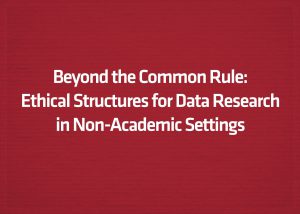"Databuse" as the Future of Privacy?
Is “privacy” such a broad concept as to be meaningless from a legal and policy perspective? On Tuesday, October 14th, the Center for Democracy & Technology hosted a conversation with Benjamin Wittes and Wells Bennett, frequently of the national security blog, Lawfare, to discuss their recent scholarship on “databuse” and the scope of corporate responsibilities for personal data.
Coming from a world of FISA and ECPA, and the detailed statutory guidance that accompanies privacy in the national security space, Wittes noted that privacy law on the consumer side is vague and amorphous, and largely “amounts to don’t be deceptive and don’t be unfair.” Part of the challenge, as number privacy scholars have noted, is that privacy encompasses a range of different social values and policy judgments. “We don’t agree what value we’re protecting,” Wittes said, explaining that government privacy policies have values and distinctions such as national borders and citizen/non-citizen than mean something.
Important distinctions are much less easier to find in consumer privacy. Wittes’ initial work on “databuse” in 2011 was considerably broader and more provocative, applying to all data controllers — first and third party, but his follow-up work with Bennett attempted to limit its scope to the duties owed to consumers exclusively by first parties. According to the pair, this core group of duties “lacks a name in the English language” but “describe a relationship best seen as a form of trusteeship.”
Looking broadly at law and policy around data use, including FTC enforcement actions, the pair argue that there is broad consensus that corporate custodians face certain obligations when holding personal data, including (1) obligations to keep it secure, (2) obligations to be candid and straightforward with users about how their data is being exploited, (3) obligations not to materially misrepresent their uses of user data, and (4) obligations not to use them in fashions injurious to or materially adverse to the users’ interests without their explicit consent. According to Wittes, this core set of requirements better describes reality than any sort of “grandiose conception of privacy.”
“When you talk in the broad language of privacy, you promise consumers more than the legal and enforcement system can deliver,” Wittes argued. “If we want useful privacy policy, we should focus on this core,” he continued, noting that most of these requirements are not directly required by statute.
Bennett detailed how data uses fall into three general categories. The first, a “win/win” category,” describes where the interests of business and consumers align, and he cited the many uses of geolocation information on mobile devices as a good example of this. The second category reflects cases where businesses directly benefit but consumers face a neutral value proposition, and Bennett suggested online behavioral advertising fit into this second category. Finally, a third category of uses are when businesses benefit at consumer’s expense, and he argued that regulatory action would be appropriate to limit these behaviors.
Bennett further argued that this categorization fit well with FTC enforcement actions, if not the agency’s privacy rhetoric. “FTC report often hint at subjective harms,” Bennett explained, but most of the Commission’s actions target objective harms to consumers by companies.
However, the broad language of “privacy” distorts what harms the pair believe regulators — and consumers, as well — are legitimately concerned about. Giving credit to CDT for initially coining the term “databuse,” Wittes defines the term as follows:
[T]he malicious, reckless, negligent, or unjustified handling, collection, or use of a person’s data in a fashion adverse to that person’s interests and in the absence of that person’s knowing consent. . . . It asks not to be left alone, only that we not be forced to be the agents of our own injury when we entrust our data to others. We are asking not necessarily that our data remain private; we are asking, rather, that they not be used as a sword against us without good reason.
CDT’s Justin Brookman, who moderated the conversation, asked whether (or when) price discrimination could turn into databuse.
“Everyone likes [price discrimination] when you call it discounts,” Wittes snarked, explaining that he was “allergic to the merger of privacy and antidiscrimination laws.” Where personal data was being abused or unlawful discrimination was transpiring, Wittes supported regulatory involvement, but he was hesitant to see both problems as falling into the same category of concern.
The conversation quickly shifted to a discussion of the obligations of third parties — or data brokers generally — and Wittes and Bennett acknowledged they dealt with the obligations of first parties because its an easier problem. “We punted on third parties,” they conceded, though Wittes’ background in journalism forced him to question how “data brokers” were functionally different from the press. “I haven’t thought enough about the First Amendment law,” he admitted, but he wasn’t sure what principle would allow advocates to divine “good” third parties and “bad” third parties.
But if the pair’s theory of “databuse” can’t answer every question about privacy policy, at least we might admit the term should enter the privacy lexicon.
-Joseph Jerome, Policy Counsel



